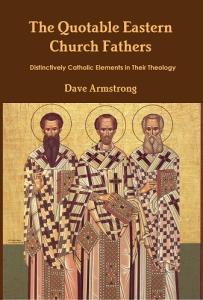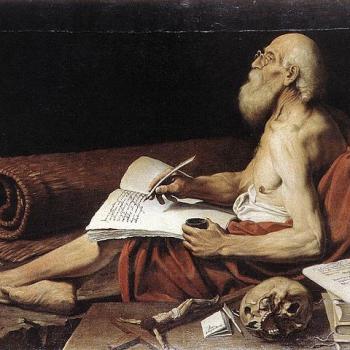“Please Hit ‘Subscribe’”! If you’ve received benefit from this or any of my 4,500+ articles, please follow this blog by signing up (email address) on the sidebar to the right, above the icon bar, “Sign Me Up!”: to receive notice when I post a new blog article. This is the equivalent of subscribing to a YouTube channel. Please also consider following me on Twitter / X and purchasing one or more of my 55 books. All of this helps me get more exposure and concretely supports my full-time apologetics work. Thanks so much and happy reading!
*****
“Faith Alone” (sola fide in Latin) is one of the two “pillars” of the Protestant “Reformation” (along with sola Scriptura: Scripture Alone). Protestants use the term “reformation” of their origins in the 16th century because it’s their belief that they were bringing back the teachings of the early Church which the Catholic Church supposedly had corrupted or lost altogether (hence, the description of “reform”). This is standard Protestant playbook talking points.
The serious problem with this outlook, however, is that — taking these two pillars as prime examples –, both are virtually absent in the Church fathers. The universality of the rejection of both is quite striking and remarkable. I massively document many individual fathers’ views on the rule of faith in the “Bible / Tradition / Sola Scriptura . . .” section of my Fathers of the Church web page. Concerning faith alone, the late Protestant apologist Norman Geisler wrote:
[O]ne can be saved without believing that imputed righteousness (or forensic justification) is an essential part of the true gospel. Otherwise, few people were saved between the time of the apostle Paul and the Reformation, since scarcely anyone taught imputed righteousness (or forensic justification) during that period! . . . . . (Roman Catholics and Evangelicals: Agreements and Differences, with Ralph E. MacKenzie, Grand Rapids, Michigan: Baker Book House, 1995, 502, 85, 222; my italics and bolding)
Similarly, the renowned Protestant scholar Alister McGrath stated:
Whereas Augustine taught that the sinner is made righteous in justification, Melanchthon taught that he is counted as righteous or pronounced to be righteous. For Augustine, ‘justifying righteousness’ is imparted; for Melanchthon, it is imputed in the sense of being declared or pronounced to be righteous. Melanchthon drew a sharp distinction between the event of being declared righteous and the process of being made righteous, designating the former ‘justification’ and the latter ‘sanctification’ or ‘regeneration.’ For Augustine, these were simply different aspects of the same thing . . .
The importance of this development lies in the fact that it marks a complete break with the teaching of the church up to that point. From the time of Augustine onwards, justification had always been understood to refer to both the event of being declared righteous and the process of being made righteous. (Reformation Thought: An Introduction, 2nd edition, Grand Rapids, Michigan: Baker Book House, 1993, 108-109, 115; my italics and bolding)
See fuller quotes from both Geisler and McGrath. The famous Protestant Church historian Philip Schaff exhibits more bias, but essentially concurs, as to the historical facts:
If any one expects to find in this period [100-325], or in any of the church fathers, Augustin himself not excepted, the Protestant doctrine of justification by faith alone, . . . he will be greatly disappointed . . . Paul’s doctrine of justification, except perhaps in Clement of Rome, who joins it with the doctrine of James, is left very much out of view, and awaits the age of the Reformation to be more thoroughly established and understood. (History of the Christian Church, Vol. 2, 588-589)
Despite this scholarly consensus, some folks still don’t get it. The Protestant evangelical anti-Catholic apologist Jason Engwer wrote on 2-20-20: “The claim that nobody believed in justification through faith alone before the Reformation, or between the time of the apostles and the Reformation, is false.” Okay! As far as I know, Jason is not a scholar.
My aim in the present paper is to document in a concise summary form, some of the very best quotations in this regard from the Church fathers, that illustrate the universal consensus against “faith alone” and for the Catholic view regarding faith and works as organically connected, and infused justification (no separation of justification and sanctification). Most of these, I found myself, in laborious searches. Following each name is a link for the reader who wishes to pursue additional related statements from the same Church father.
***
Pope Clement of Rome (d. c. 101) [see more]
Let us therefore earnestly strive to be found in the number of those that wait for Him, in order that we may share in His promised gifts. But how, beloved, shall this be done? If our understanding be fixed by faith towards God; if we earnestly seek the things which are pleasing and acceptable to Him; if we do the things which are in harmony with His blameless will; and if we follow the way of truth, casting away from us all unrighteousness and iniquity, along with all covetousness, strife, evil practices, deceit, whispering, and evil-speaking, all hatred of God, pride and haughtiness, vain glory and ambition. (Epistle to the Corinthians, 35)
Ignatius of Antioch (50 – c. 110) [see more]
I also am the more encouraged, resting without anxiety in God, if indeed by means of suffering I may attain to God, so that, through your prayers, I may be found a disciple [of Christ]. (Epistle to Polycarp, ch. 7)
Epistle of Mathetes to Diognetus (possibly as early as 130, or as late as 180) [see more]
When you have read and carefully listened to these things, you shall know what God bestows on such as rightly love Him, being made [as you are] a paradise of delight, presenting in yourselves a tree bearing all kinds of produce and flourishing well, being adorned with various fruits. (ch. 12)
Shepherd of Hermas (c. 150) [see more]
Have a care, then, you who serve the Lord, and have Him in your heart, that you work the works of God, remembering His commandments and promises which He promised, and believe that He will bring them to pass if His commandments be observed. Instead of lands, therefore, buy afflicted souls, according as each one is able, and visit widows and orphans, and do not overlook them; and spend your wealth and all your preparations, which you received from the Lord, upon such lands and houses. For to this end did the Master make you rich, that you might perform these services unto Him; . . . work your own work, and you will be saved. (Bk. III, Similitude 1)
Polycarp (69-155) [see more]
But He who raised Him up from the dead will raise us up also, if we do His will, and walk in His commandments, and love what He loved, keeping ourselves from all unrighteousness, covetousness, love of money, evil speaking, false witness; . . . (Epistle to the Philippians, ch. 2)
Justin Martyr (100-165) [see more]
[E]ach man goes to everlasting punishment or salvation according to the value of his actions. (First Apology, ch. 12)
Theophilus (d. c. 180) [see more]
[K]eeping the commandment of God, he should receive as reward from Him immortality, . . . For as man, disobeying, drew death upon himself; so, obeying the will of God, he who desires is able to procure for himself life everlasting. For God has given us a law and holy commandments; and every one who keeps these can be saved, . . . (To Autolycus, Bk. II, ch. 27)
Irenaeus (130-202) [see more]
[T]hose who believe God and follow His word receive that salvation which flows from Him. Those, on the other hand, who depart from Him, and despise His precepts, and by their deeds bring dishonour on Him who made them, and by their opinions blaspheme Him who nourishes them, heap up against themselves most righteous judgment. (Against Heresies, Bk. IV, 33, 15)
Clement of Alexandria (c. 150 – c. 215) [see more]
. . . the elect being saved by instruction, and purification, and the doing of good works. . . . For by grace we are saved:
not, indeed, without good works; but we must, by being formed for what is good, acquire an inclination for it. (The Stromata, Bk. V, ch. 1)
Tertullian (c. 160 – c. 220) [see more]
But even if the stimulus of her repentance proceeded from her faith, she heard her justification by faith through her repentance pronounced in the words, Your faith has saved you,
by Him who had declared by Habakkuk, The just shall live by his faith.
[Habakkuk 2:4] (Against Marcion, Bk. IV, ch. 18)
Hippolytus (d. c. 235) [see more]
He, in administering the righteous judgment of the Father to all, assigns to each what is righteous according to his works. . . . the justification will be seen in the awarding to each that which is just; since to those who have done well shall be assigned righteously eternal bliss, and to the lovers of iniquity shall be given eternal punishment. . . . the righteous will remember only the righteous deeds by which they reached the heavenly kingdom, . . . (Against Plato, On the Cause of the Universe, 3)
Origen (c. 185 – c. 253) [see more]
So also in the race of our life we ourselves must expend labour, and bring diligence and zeal to bear; but it is from God that salvation is to be hoped for as the fruit of our labour. Otherwise, if God demand none of our labour, His commandments will appear to be superfluous. . . . And in the matter of our salvation, what is done by God is infinitely greater than what is done by ourselves . . . (De Principiis, Bk. III, ch. 1, 18)
Cyprian (210-258) [see more]
Confession is the beginning of glory, not the full desert of the crown; nor does it perfect our praise, but it initiates our dignity; and since it is written, He that endures to the end, the same shall be saved,
[Matthew 10:22] whatever has been before the end is a step by which we ascend to the summit of salvation, not a terminus wherein the full result of the ascent is already gained. (Treatise 1: On the Unity of the Church, 21)
Lactantius (c. 240 – c. 320)
For this reason He has given us this present life, that we may either lose that true and eternal life by our vices, or win it by virtue. (Divine Institutes, Bk. VII, ch. 5)
Alexander of Alexandria (d. 328)
Since therefore you know, brethren beloved, that the malignant and the unbelieving are the enemies of righteousness, beware of these, embrace faith and charity, by which all the holy men who have existed from the beginning of the world to this day have attained unto salvation. And show forth the fruit of charity, not in words only, but also in deeds, that is, in all godly patience for God’s sake. (Epistles on Arianism and the Deposition of Arius, ch. 5, 2)
Hilary of Poitiers (c. 315-368)
Election, therefore, is not a thing of haphazard judgment. It is a distinction made by selection based on merit. Blessed, then, is he whom God elects: blessed for the reason that he is worthy of election. (On Psalm 64 [65], section 5; in William A. Jurgens, editor and translator, The Faith of the Early Fathers, three volumes [Collegeville, Minnesota: Liturgical Press], Vol. 1 [1970], 386)
Athanasius (c. 297-373)
For it is not productive of virtue, nor is it any token of goodness. For none of us is judged for what he knows not, and no one is called blessed because he hath learning and knowledge. But each one will be called to judgment in these points–whether he have kept the faith and truly observed the commandments. (Life of Antony, 33)
Basil the Great (c. 330-379)
Eternal rest awaits those who have struggled through the present life observant of the laws, not as payment owed for their works, but bestowed as a gift of the munificent God on those who have hoped in him. (On Psalm 114, no. 5; in Jurgens, ibid., Vol. 2 [1979], 22)
Cyril of Jerusalem (c. 315-387)
[F]or the time to come ye must behave yourselves worthily of this grace both in words and deeds, that you may all be enabled to enjoy the life everlasting. (Eighteenth Catechetical Lecture, 33)
Gregory Nazianzen (c. 330 – c. 390)
For our salvation is not so much a matter of words as of actions . . . (Oration 43, 68)
Gregory of Nyssa (c. 335 – c. 394)
Paul, joining righteousness to faith and weaving them together, constructs of them the breastplates for the infantryman, armoring the soldier properly and safely on both sides. A soldier cannot be considered safely armored when either shield is disjoined from the other. For faith without works of justice is not sufficient for salvation; neither, however, is righteous living secure in itself for salvation, if it is disjoined from faith. (Homilies on Ecclesiastes, 8; Jurgens, ibid., Vol. 2 [1979], 45-46)
Ambrose (c. 336-397) [see more]
The deserts of each one of us are suspended in the balance, which a little weight either of good works or of degenerate conduct sways this way or that; if the evil preponderate, woe is me! if the good, pardon is at hand. For no man is free from sin; but where good preponderates, the evil flies up, is overshadowed, and covered. Wherefore in the Day of judgement our works will either succour us, or will sink us into the deep, weighed down as with a millstone. For iniquity is heavy, supported as by a talent of lead; avarice is intolerable, and all pride is foul dishonesty. Wherefore exhort the people of God to trust rather in the Lord, to abound in the riches of simplicity, wherein they may walk without snare and without hindrance. (Letter II: To Constantius, a Bishop, 16; from The Letters of S. Ambrose, Oxford: 1881)
John Chrysostom (c. 345-407) [see more]
How then can one be saved? it may be asked. By application of the countervailing remedies: alms, prayers, compunction, repentance, humility, a contrite heart, contempt of possessions. For God hath marked out for us innumerable ways of salvation, if we be willing to attend. Let us then attend, and let us every way cleanse out our wounds, showing mercy, remitting our anger against them that have displeased us, giving thanks for all things to God, fasting according to our power, praying sincerely, “making unto ourselves friends of the mammon of unrighteousness.” For so shall we be able to obtain pardon for our offenses, and to win the promised good things; whereof may we all be counted worthy, . . . (Homily 41 on Matthew 12:25-26, 6)
Jerome (c. 343-420)
For it is not accordant with the righteousness of God to forget good works, . . . The Apostle James also, knowing that the baptized can be tempted, and fall of their own free choice, says: “Blessed is the man that endureth temptation: for when he hath been approved, he shall receive the crown of life, which the Lord promised to them that love him.” . . . God created us with free will, and we are not forced by necessity either to virtue or to vice. Otherwise, if there be necessity, there is no crown. As in good works it is God who brings them to perfection, for it is not of him that willeth, nor of him that runneth, but of God that pitieth and gives us help that we may be able to reach the goal . . . It was useless to warn them to add works to faith, if they could not sin after baptism. . . . John the apostle, or rather the Saviour in the person of John, writes thus to the angel of the Church of Ephesus: I know your works and your toil and patience, and that you bore for my name’s sake, and hast not grown weary. But I have this against you, that you left your first love. Remember therefore from whence you are fallen, and repent, and do the first works; or else I will come to you, and will move your candlestick out of its place, unless you repent.
Similarly He urges the other churches, Smyrna, Pergamos, Thyatira, Sardis, Philadelphia, Laodicea, to repentance, and threatens them unless they return to the former works. (Against Jovinian, Bk. II, 3)
Theodore of Mopsuestia (c. 350-428)
Paul did not say we hold because he was himself uncertain. He said it in order to counter those who concluded from this that anyone who wished to could be justified simply by willing faith. Note carefully that Paul does not say simply without the law, as if we could just perform virtue by wanting to, nor do we do the works of the law by force. We do them because we have been led to do them by Christ. (Pauline Commentary From the Greek Church; commenting on Romans 3:28; in Gerald Bray, editor, Ancient Christian Commentary on Scripture: New Testament VI: Romans [Downers Grove, Illinois: InterVarsity Press, 1998], 104-105)
Augustine (354-430) [see more]
This question, then, seems to me to be by no means capable of solution, unless we understand that even those good works of ours, which are recompensed with eternal life, belong to the grace of God, because of what is said by the Lord Jesus: Without me you can do nothing. [John 15:5] And the apostle himself, after saying, By grace are you saved through faith; and that not of yourselves, it is the gift of God: not of works, lest any man should boast; [Ephesians 2:8-9] saw, of course, the possibility that men would think from this statement that good works are not necessary to those who believe, but that faith alone suffices for them; and again, the possibility of men’s boasting of their good works, as if they were of themselves capable of performing them. To meet, therefore, these opinions on both sides, he immediately added, For we are His workmanship, created in Christ Jesus unto good works, which God has before ordained that we should walk in them. [Ephesians 2:10] What is the purport of his saying, Not of works, lest any man should boast, while commending the grace of God? And then why does he afterwards, when giving a reason for using such words, say, For we are His workmanship, created in Christ Jesus unto good works? Why, therefore, does it run, Not of works, lest any man should boast? Now, hear and understand. Not of works is spoken of the works which you suppose have their origin in yourself alone; but you have to think of works for which God has moulded (that is, has formed and created) you. For of these he says, We are His workmanship, created in Christ Jesus unto good works. . . . as your good life is nothing else than God’s grace, so also the eternal life which is the recompense of a good life is the grace of God; moreover it is given gratuitously, even as that is given gratuitously to which it is given. But that to which it is given is solely and simply grace; this therefore is also that which is given to it, because it is its reward —grace is for grace, as if remuneration for righteousness; in order that it may be true, because it is true, that God shall reward every man according to his works.
(On Grace and Free Will, ch. 20; written in 436 or 427, just 3 or 4 years before he died)
John Cassian (c. 360 – c. 435)
[T]he beginning of our good will is given to us by the inspiration of the Lord, when He draws us towards the way of salvation either by His own act, or by the exhortations of some man, or by compulsion; and that the consummation of our good deeds is granted by Him in the same way: but that it is in our own power to follow up the encouragement and assistance of God with more or less zeal, and that accordingly we are rightly visited either with reward or with punishment, because we have been either careless or careful to correspond to His design and providential arrangement made for us with such kindly regard. . . . And by this testimony we can clearly see what we ought to ascribe to free will, and what to the design and daily assistance of the Lord, and that it belongs to divine grace to give us opportunities of salvation and prosperous undertakings and victory: but that it is ours to follow up the blessings which God gives us with earnestness or indifference. (Conference 3, ch. 19)
Cyril of Alexandria (c. 376-444)
It is a true saying, that the fruit of good deeds is honourable. For those who wish to lead lives pure and undefiled as far as is possible for men, Christ will adorn with His gifts, and grant them an abundant recompense for all their saintly deeds, and make them partakers of His glory. (Commentary on Luke, v. 9:1-5; translated by R. Payne Smith, Oxford University Press, 1859)
Pope Leo the Great (c. 400-461)
[Y]ou ought all to help one another in turn, that in the kingdom of God, which is reached by right faith and good works, you may shine as the sons of light . . . (Sermon 33, 5)
Theodoret (c. 393 – c. 466)
Well-doing is for a time, but the reward is eternal . . . Paul wanted to show that there are many rewards for those who are good. (Interpretation of the Letter to the Romans; commentary on Romans 2:7; in Bray, ibid., 60)
*
Related Reading
*
*
Practical Matters: Perhaps some of my 4,600+ free online articles (the most comprehensive “one-stop” Catholic apologetics site) or fifty-five books have helped you (by God’s grace) to decide to become Catholic or to return to the Church, or better understand some doctrines and why we believe them.
Or you may believe my work is worthy to support for the purpose of apologetics and evangelism in general. If so, please seriously consider a much-needed financial contribution. I’m always in need of more funds: especially monthly support. “The laborer is worthy of his wages” (1 Tim 5:18, NKJV). 1 December 2021 was my 20th anniversary as a full-time Catholic apologist, and February 2022 marked the 25th anniversary of my blog.
PayPal donations are the easiest: just send to my email address: apologistdave@gmail.com. Here’s also a second page to get to PayPal. You’ll see the term “Catholic Used Book Service”, which is my old side-business. To learn about the different methods of contributing (including Zelle), see my page: About Catholic Apologist Dave Armstrong / Donation Information. Thanks a million from the bottom of my heart!
*
***
Photo credit: see book and purchase information for this volume that I edited.
Summary: All of the Church fathers — as Protestant scholars themselves concede — denied the novel Protestant doctrine and “pillar” of “faith alone” or sola fide.


















